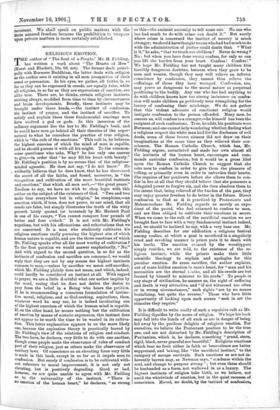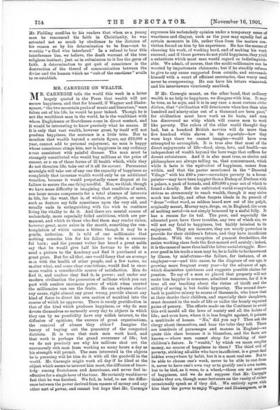RELIGIOUS EMOTION.
THE author of "The Soul of a People," Mr. H. Fielding, .has written a work about " The Hearts of Men " (Hurst and Blackett, 10s. 6d. net). The former dealt princi- pally with Burmese Buddhism, the latter deals with religion as the author sees it existing in all men irrespective of their creed or persuasion. In his eyes, we gather, all faiths, in so far as they can be expressed in creeds, are equally false, while all religions, in so far as they are expressions of emotion, are alike true. There are, he thinks, certain religious instincts existing always, modified from time to time by circumstances and brain developments. Briefly, these instincts may be broUght under three heads, — the instinct of confession, the instinct of prayer, and the instinct of sacrifice. To satisfy and explain these three fundamental cravings men have evolved a god or gods. In this inversion of the ordinary argument lies the key to Mr. Fielding's book, and he would have men go behind all their theories of the super- natural to what he considers the practice of true religion, which is "the cult of the emotions." This cult is, he believes, the highest exercise of which the mind of man is capable, and he should pursue it with all his might. To the common- sense questioner who asks, Why ? he has only one answer to give,—in order that " he may fill his heart with beauty." kr. Fielding's position is by no means that of the religious- minded agnostic. He does not say, " I do not know." He evidently believes that he does know, that he has discovered the secret of all the faiths, and found, moreover, in " the recognition and cultivation of the more beautiful instincts and emotions," that which all men seek,—" the great peace." Needless to say, we have no wish to chop logic with this author on the subject of the existence of God. " Two and two make four everywhere but in religion," he complains,—an assertion which, if true, does not prove, to our mind, that all creeds are false, but simply illustrates the truth of the witty proverb lately quoted (or invented) by Mr. Herbert Paul in one of his essays, " You cannot compare four pounds of butter and four o'clock." It is not with Mr. Fielding's negations, but with his affirmations and exhortations that we are concerned. Is a man who studiously cultivates his religious emotions really pursuing the highest aim of which human nature is capable, and are the three emotions of which Mr. Fielding speaks after all the most worthy of cultivation ? To the fl first question we would answer emphatically, " No." And with regard to the second question, in so far as the instincts of confession and sacrifice are concerned, we would reply that they are not by any means the highest instincts common to man,—unless by sacrifice we mean self-sacrifice, which Mr. Fielding plainly does not mean, and which, indeed, could hardly be considered an instinct at all. With regard to prayer, we are a little doubtful what our author implies by the word, seeing that he does not derive the desire to pray from the belief in a Being . who hears the petition. If he is recommending a conscious formulation of instinc- tive moral, religious, and so God-seeking, aspirations, then, whatever word he may use, he is indeed inculcating one of the highest exercises of which-the human mind is capable. If, on the other hand, he means nothing but the cultivation of emotion by means of ecstatic expression, this instinct does not appear to be worth the time to be wasted in its cultiva- tion. This latter explanation appears to us the more likely one, because the aspiration theory is practically barred by Mr. Fielding's view of the relations of religion and conduct. The two have, he declares, very little to do with one another, though some people make the observance of rules of conduct part of their religion, just as others make the observance of sanitary laws. Of conscience as an elevating force very little is made in this book, except in so far as it impels men to confession. But surely if confession is to be cultivated with- out reference to moral improvement, it is not only not elevating, but is positively degrading. Good or . bad, however, we are quite unable to agree with Mr. Fielding as . to the universality of the instinct. " There is no emotion of the human heart," he declares, " so strong
as this—the eminent necessity to tell sonic, 'NO one who
has had much to do with crime can doubt it." But surely where crime is concerned the instinct of secrecy is much stronger; we should have thought no one who had had much to do. with the administration of justice could doubt that "What is it," he asks, " that we teach our children ? Never do wrong ? No ; but when you have done wrong confess, for only so can you lift the burden from your heart. Confess! Confess!" We hope Mr. Fielding has not taught many children 'this horribly dangerous doctrine, because when they grow to be men and women, though they may well relieve an inferior conscience by confession, . they . cannot thus relieve the sufferings of those they have wronged. Confession, too, may prove as dangerous to the moral nature as perpetual poulticing to the bodily. Any one who has had anything to do with children knows how too strong insistence on confes- sion will make children go perilously near wrongdoing for the luxury of confessing their misdoings. We do not gather that this violent advocate of emotional religion would instigate confession to the person offended. Many, men, he assures us, will confess to a stmnger,—he himself has been the recipient of such confessions. True, he adds, his penitents were Burmese; and one cannot help wondering whether, finding what a religious respect the white man had for the disclosure of evil deeds, some of these brown sinners did not draw on their imaginations at the same time as they relieved their con- sciences. The Roman Catholic Church, which has, Mr. Fielding argues, assimilated and made her own almost all the instincts of the human heart, encourages and comn wands auricular confession; but it would be a gross libel upon the Roman Catholic Church to suggest that she asks men to confess in order to give them the pleasure of telling, or primarily even in order to unburden their hearts. She requires of .her penitents before she allows them to con- fide in her at all that they should believe that she possesses a delegated power to forgive sin, and she then absolves them to the intent that, being relieved of the burden of , the past, they may enjoy greater freedom to do better in the future. Direct confession to God as it is practised by Protestants and Mahommedans Mr. Fielding regards as merely an expe- dient of the proud, who feel ashamed to confess to men, and are thus obliged to cultivate their emotions in secret. When we come to the cult of the sacrificial emotion we are brought face to face with a very fundamental instinct indeed; and, we should be inclined to say, with a very base one. Mr. Fielding describes for our edification a religious festival among coolies, at which a goat is sacrificed in a singularly cruel and revolting manner (a priest puts it to death with his teeth). The emotion evinced by the worshipperel simply testifies, we are told, to the existence of the. re- ligious instinct, while the' priests make their little scientific theology to explain and apologise for this peculiar emotion. So arose sacrifice, the author explains; out of some hidden emotion in man's heart, for "man and his necessities are the eternal t..uths, and all his creeds are'but framed by himself to minister to his needs." To people in any, stage of civilisation, he assures us, the sight of suffering and death is very attractive, and " if not witnessed too often or in wrong circumstances," such sights "are by no means brutalising, but quite the reverse." - Those who have little opportunity of looking upon such scenes " seek in art the stimulus they require."
It is difficult to write coolly of such a repulsive cult as Mr. Fielding dignifies by the name of religion. We hope his book may fall into the hands of all such as are in danger of being led away by the perilous delights of religious emotion. For ourselves, we believe the Protestant position to be the true one, and are not disturbed by Mr. Fielding's description of Puritanism, which is, be declares, something " grand, stern, rigid, black, never graceful nor beautiful." Religious emotions which bear no fruit either in faith or benevolence are better suppressed, and belong, like "the sacrificial instinct," to the category of savage survivals. Such emotions as are not in. herently barren may, as Newman says, " czndense within the soul, and change to purpose strong " ; but'even these should be husbanded as a force, not wallowed in as a luxury. The highest instincts of religion take birth; as we believe, not amid the whirlwinds of emotion, but in the quiet *cease; of conscience. Moved, no doubt, by the instinct of confession, Mr. Fielding confides to his readers that when as a young man he renounced his faith in Christianity, he was actuated not so much by obedience to the dictates of his reason as by his determination to be free—not to worship " a God who interfered." In a refusal to bear this interference lies, we believe, the death warrant of the true religious instinct; just as in submission to it lies the germ of faith. A determination to get quit of conscience is the destruction of the thread of communication between the divine and the human which no "cult of the emotions " avails to re-establish.



























































 Previous page
Previous page